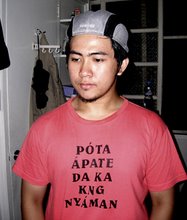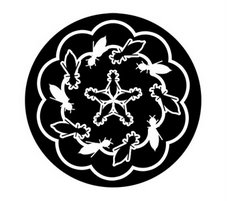Kulit Isip
I
After resting for about twenty minutes beside the White Rock, the two began hiking past it to reach their destination.
It was a cloudless night. The sight of the starry sky gave Perry the feeling that all the constellations were watching in intrigue their journey to the crater of the mystic
“Pare,” Perry calmly called out to his younger but more serious-looking companion, who was carefully watching their way with a more high-powered flashlight, “does it not amuse you that whenever you look at the starry night sky, you are actually seeing the past, since it takes light years before their light reaches our world, and by the time that happens, the stars physically have moved to different locations?”
The amused one combed back his brown hair—the color being a result of his father being a White American. “A deception indeed if you think about it, Quiel,” he elaborated, “and it makes you think: if astrologists base their prophecies from the stars, aren’t their predictions late already by the time they blurt them out to people?”
Quiel expressed no sign of amusement for he already heard that from Perry a number of times. “Before contemplating on things as distant as stars, Mr. Whitman, you might want to ponder closer to home,” he snapped while shooing the insects that flock around his light. “That’s exactly the reason that we are on this mission.”
Perry suddenly remembered all the times he was called a nerd in high school back in
Taking out his hanky to wipe off his sweat on the forehead despite the coldness of the place, Perry shifted his focus to the full moon, not too astonished by its misleading brightness against the dark ether for he knew it did not emit its own light.
Quiel for a few seconds also looked up to catch a glimpse of the moon. Suddenly, he remembered his grandfather’s siesta stories back when he was still a child—that bamboo pole duel between Sinukuan, the legendary deity of Mount Arayat, and Namalyari, of Mount Pinatubo of the Zambales mountain range. He would remember Apung[1] Nording reenacting how Sinukuan hit Namalyari’s eye, causing him/her to give off fainter light, thus, Bulan, or the moon. Sinukuan became ruler of the day as Aldo, the sun.
Quiel shattered his reminiscing of his magical childhood upon realization that he was already a lecturer of natural science in the University of the Philippines Pampanga Campus. It’s time he took hold of knowledge on nature, he thought; enough of folk people or institutions simply feeding the knowledge to him.
Perry still could not forget the young lecturer’s advice of sticking to things closer to home. He affirmed proudly, “Home is filled with domestic matters which I, a physics wizard, am not interested in. I understand that you, a third world country citizen, are concerned about that still. But we of the West have mastered science and are taking the responsibility of knowing the environment of Mother Gaea for you guys. We take care of cosmic affairs; you take care of earthy home. That’s division of labor for humanity.”
“And all we have to do is buy your books and study your language,” Quiel whispered in response to Perry’s racist remark. The half-American did not hear him.
“The space beyond, the governing laws, and the nature of matter are plainly much more interesting, much more mysterious,” Perry stated while raising his hands above his head as if wanting to soar to the sky and escape the gravity of domestic Earth.
His sight focused above, the outer space maniac tripped over a mossy log and fell on a shallow puddle of mud that slightly smelled putridly, defiling his aging hands which a few minutes ago where ambitiously reaching for the stars. “Putang bengi[2]!” he shouted—a local malediction he absorbed in his vocabulary from his Filipino mother who tried hard to speak in English in spite of not finishing high school to communicate with her American husband. Struggling to take his hands off the puddle of filth, he was looking around, thinking wildly whom or what to blame for the situation, not welcoming the idea that he was at fault for negligence.
Quiel looked back, not to aid in concern for his hiking companion, but to deliver a quick sermon to him, in spite of Perry being thirteen years older than him. “When I say closer to home,” he stated without smiling, “I mean closer to home. See what happens when you mentally marginalize things as simple—but urgent—as a log lying carelessly along the way?”
Perry was busy washing the dirt off his palms with his penultimate stock of bottled water, but was able to catch Quiel’s words. Dominated by pride, he refused to acknowledge the lecture and proceeded to asking if the crater was still far away.
As they continued trekking to the top, torn pieces of cloud began creeping, blanketing parts of the night sky, and reducing the brightness of the moon, but increasing the radius of its halo. Hike they did for hours with homesickness growing on Perry’s face like the bitterness of apalya[3] sticking to his taste buds, and exhilaration bit by bit wanting to come out of Quiel’s mouth, as apparent in his smile that widened every time they inched closer to the target destination.
After four hours of getting lost, catching their stamina, and finding their way, they saw the alleged stone building in the crater. Some had claimed it was a temple to worship the god or goddess of the ancient Kapampangans[4]. Some had claimed it was a hideout erected by the revolutionaries during the Spanish occupation and by communist groups that found prominence in the community during the Second World War. But to Quiel, there was something greater.
The grave expression which Quiel hours ago sported was replaced by an evil, excited look, as if the full moon had finally drawn his alter ego out. “Behold, Perry Whitman of the West!” he shouted in the summit. “In that rickety building you see lie the key to ultimate science and technology combined!”
Quiel turned to his companion with a bragging look and told him, “And I, Exequiel Galura, a Pampango of the Philippine Republic of South East Asia, have brought you so-called wizard of science here.”
Perry jumped in surprise. He never knew the introvert Quiel could shout like a punk rocker proclaiming protest against senseless pop music.
“What could you—a resident of a country stuck still in a stage of neocolonial mentality—show me in this place that would thwart my pride with the scientific achievements of my father’s homeland?”
The racist remark did not bother the young lecturer that time. Quiel began walking toward the building, the history of which was still being studied by local scholars.
Perry followed, but still went on discussing the imperial power of his country. “Look at you,” he said. “You dress like a Westerner, write using the Roman alphabet system, are in an adopted-from-the-West political system, can speak better in English than in your own—what do you guys call your language again?”
Quiel still was not giving a damn to all of Perry’s belittling statements. The thrill encrypted inside the mysterious building deserved more attention than the prejudicial Filipino-American behind him, he thought.
Perry remembered the magic word suddenly, thanks to his short conversations with Kapampangan linguistic diversity advocates in the Internet. “Oh, right, Amanung Sisuan[5],” he pronounced with an American accent.
“Why, probably even the science shows you’re watching at home—NGC, Discovery, Animal Planet—were baked by the West for you to merely dip your forks in and munch to your tummy’s satisfaction! Thank us for the knowledge we share to you.”
They reached the front of the building. Perry realized that all his words—which he intended to sound too boastful to hurt his companion’s ego—was not being listened to.
“Enough with the mystique,” Perry finally remarked. “What’s with the place? It doesn’t even look like a temple or what.”
“Judge not a book by its cover,” Quiel commented back. “And sometimes, the book being judged is not even the right book.”
Quiel got out a folded map—like a detailed overview of
Not carrying any shovel to ease their way up the summit, they had no choice but to use their hands like primitives in unearthing, to the exasperation of Perry. They dug the earth on the left of the building; Quiel was digging faster than his companion as if battery-energized.
Without Perry noticing, Quiel grabbed his last bottled water and poured all of its content to their hole to soften the soil. Perry wanted to frown upon realizing but was held back by the fact that he no longer could do anything about it.
After ten more minutes, “Oyni[6]! Oyni! Oyni!” the excited one exclaimed, as he pushed Perry back—as if only Quiel should see the thing first—and pulled vehemently up the hole a slightly flat, tin rectangular box.
Perry was beginning to find Quiel strange. If not only for Quiel’s academic reputation, he would think he was already going insane, especially with the psychotic look on his face. The birds which natives call balaue[7] started flying out of the trees toward somewhere else, as the clouds that blur the moonlight have now cleared the sky above the crater.
“So what’s inside that case?” Perry asked. “More documented tales about Jose Rizal and his women?”
“These,” Quiel slithered eerily, “are the Kulit Isip.”
The treasure hunter’s eyes were glued only to the surface of the box. Without looking at Perry, he told him, “But of course, as a Filipino-American who has rejected his maternal ethnicity, I bet you don’t know what that means.”
“Like I said, division of labor,” Perry was quick to answer back. “Now is when you Flip come in the scene to explain what that could possibly mean.”
Quiel began dusting off the box. He started to explicate, “Kulit Isip is a Kapampangan phrase which roughly translates to Scriptures of the Mind. Kulit, if you check Fray Diego Bergano’s 17th century dictionary, means the indigenous orthography of our ancestors. However, in your dear English language, you can call them the Mind Codes.”
[1] Apu – a title used by Kapampangans to address the names of elders
[2] A malediction in the Philippine Kapampangan language which translates to: “The night is a whore!”
[3] Native name of bitter gourd
[4] The seventh largest ethnic group in the
[5] Literally, language or word from which one suckles
[6] “Here it is!”
[7] Hawk







1 comment:
upsenesuink upsenesuinkJB
jerrey rice jersey
Aldon Smith Jersey
Authentic Vernon Davis Jersey
Post a Comment